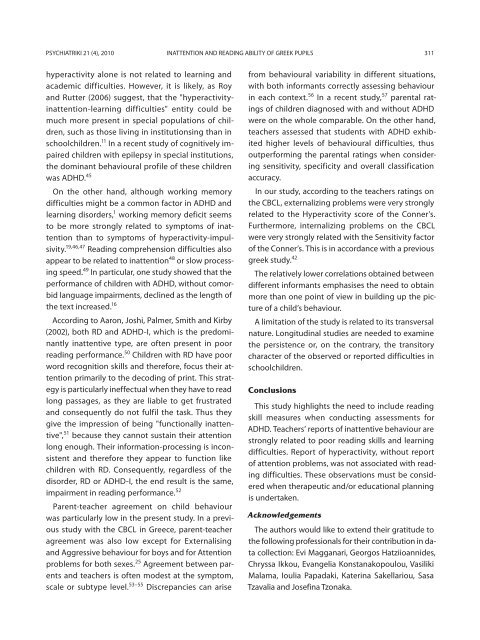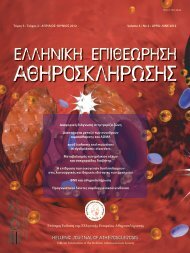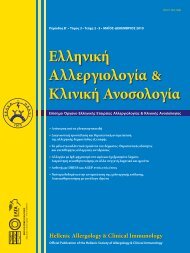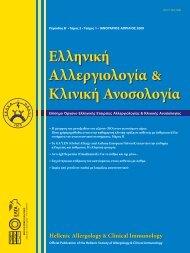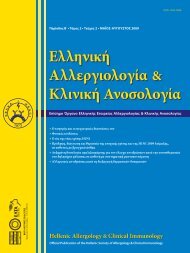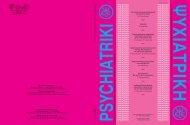ÏÏ ÏιαÏÏικη - ÎÎΤΠÎαÏÏικÎÏ ÎκδÏÏειÏ
ÏÏ ÏιαÏÏικη - ÎÎΤΠÎαÏÏικÎÏ ÎκδÏÏειÏ
ÏÏ ÏιαÏÏικη - ÎÎΤΠÎαÏÏικÎÏ ÎκδÏÏειÏ
- No tags were found...
You also want an ePaper? Increase the reach of your titles
YUMPU automatically turns print PDFs into web optimized ePapers that Google loves.
PSYCHIATRIKI 21 (4), 2010 INATTENTION AND READING ABILITY OF GREEK PUPILS 311hyperactivity alone is not related to learning andacademic difficulties. However, it is likely, as Royand Rutter (2006) suggest, that the "hyperactivityinattention-learningdifficulties" entity could bemuch more present in special populations of children,such as those living in institutionsing than inschoolchildren. 11 In a recent study of cognitively impairedchildren with epilepsy in special institutions,the dominant behavioural profile of these childrenwas ADHD. 45On the other hand, although working memorydifficulties might be a common factor in ADHD andlearning disorders, 1 working memory deficit seemsto be more strongly related to symptoms of inattentionthan to symptoms of hyperactivity-impulsivity.19,46,47 Reading comprehension difficulties alsoappear to be related to inattention 48 or slow processingspeed. 49 In particular, one study showed that theperformance of children with ADHD, without comorbidlanguage impairments, declined as the length ofthe text increased. 16According to Aaron, Joshi, Palmer, Smith and Kirby(2002), both RD and ADHD-I, which is the predominantlyinattentive type, are often present in poorreading performance. 50 Children with RD have poorword recognition skills and therefore, focus their attentionprimarily to the decoding of print. This strategyis particularly ineffectual when they have to readlong passages, as they are liable to get frustratedand consequently do not fulfil the task. Thus theygive the impression of being "functionally inattentive",51 because they cannot sustain their attentionlong enough. Their information-processing is inconsistentand therefore they appear to function likechildren with RD. Consequently, regardless of thedisorder, RD or ADHD-I, the end result is the same,impairment in reading performance. 52Parent-teacher agreement on child behaviourwas particularly low in the present study. In a previousstudy with the CBCL in Greece, parent-teacheragreement was also low except for Externalisingand Aggressive behaviour for boys and for Attentionproblems for both sexes. 25 Agreement between parentsand teachers is often modest at the symptom,scale or subtype level. 53–55 Discrepancies can arisefrom behavioural variability in different situations,with both informants correctly assessing behaviourin each context. 56 In a recent study, 57 parental ratingsof children diagnosed with and without ADHDwere on the whole comparable. On the other hand,teachers assessed that students with ADHD exhibitedhigher levels of behavioural difficulties, thusoutperforming the parental ratings when consideringsensitivity, specificity and overall classificationaccuracy.In our study, according to the teachers ratings onthe CBCL, externalizing problems were very stronglyrelated to the Hyperactivity score of the Conner’s.Furthermore, internalizing problems on the CBCLwere very strongly related with the Sensitivity factorof the Conner’s. This is in accordance with a previousgreek study. 42The relatively lower correlations obtained betweendifferent informants emphasises the need to obtainmore than one point of view in building up the pictureof a child’s behaviour.A limitation of the study is related to its transversalnature. Longitudinal studies are needed to examinethe persistence or, on the contrary, the transitorycharacter of the observed or reported difficulties inschoolchildren.ConclusionsThis study highlights the need to include readingskill measures when conducting assessments forADHD. Teachers’ reports of inattentive behaviour arestrongly related to poor reading skills and learningdifficulties. Report of hyperactivity, without reportof attention problems, was not associated with readingdifficulties. These observations must be consideredwhen therapeutic and/or educational planningis undertaken.AcknowledgementsThe authors would like to extend their gratitude tothe following professionals for their contribution in datacollection: Evi Magganari, Georgos Hatziioannides,Chryssa Ikkou, Evangelia Konstanakopoulou, VasilikiMalama, Ioulia Papadaki, Katerina Sakellariou, SasaTzavalia and Josefina Tzonaka.


